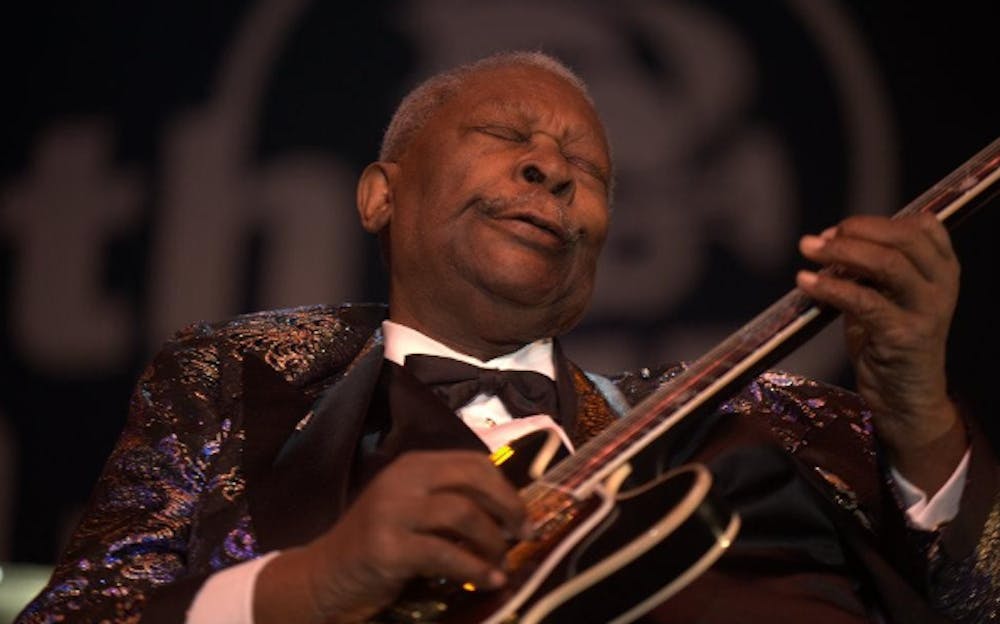B.B. King was a blues juggernaut, synonymous with the city of Memphis, whose iconic electrified guitar riffs hooked people all over the world. Just 11 years short of a century, the Beale Street Blues Boy died at 89 years old in Las Vegas earlier this year.
More than 1,500 miles from the Bluff City when he drew his last breath, a tremendous loss shook musicians and fans around the globe. The thrill was gone. His listeners gathered at candlelight vigils. And on Beale Street, a crowd honored his life outside of B.B. King’s Blues Club.
Three months have passed since Riley King died. But his legacy — decades of contributions to the blues community — have left a lingering mark on musicians and fans who continue to take note from the pioneer’s gifted approach to the music.
Brett Fleming, a Memphis DJ who has hosted “Soul Stew” on WEVL for 17 years, analyzed King’s music through the duration of the titan’s career. He likened King to another groundbreaking Memphis musician.
“He was as important to this city as Elvis Presley,” Fleming said. “I think the fact that he had such an elaborate funeral and so many people turned out, spoke volumes about what this city felt about him.”
But it wasn’t just Presley, Fleming said. King’s talents couldn’t be placed in a box. They transcended the blues genre, the DJ said.
“He was, to me, underrated as a guitarist but completely underrated as a vocalist,” Fleming said. “Whenever you listen to somebody like Frank Sinatra sing — it’s the way he phrases things. It’s the way he emphasizes certain words that made him a great singer. B.B. King had that same gift of great vocal phrasing.”
King was making “soul music” before the term ever left anyone’s tongue, according to David Evans, a University of Memphis professor who directs the Ethnomusicology and Regional Studies doctoral program of the Rudi E. Scheidt School of Music.
Evans, who has spent many years delving into the rich and textured work of Delta Blues musicians, said King’s abilities were dynamic.
“He had tremendous talent and innovation as a guitarist — inventing a style that emulates the sound of the slide guitar but that was not played with a slide,” he said. “As a singer he brought in a strong, gospel influence into blues music. A lasting gospel affect that others would imitate and join him in.”
Evans said not only were King’s talents and longevity as a recording artist impressive (with 66 years of performing), but that his personality particularly made the man an accessible staple of Memphis music.
“The few times I met him, he was very gracious. He had time for anybody that reached out to him,” he said. “Through that and his talent, he became a very good spokesperson for the blues — a type of music that has pretty much always had something of an image problem. He was able to turn that blues ‘low-life’ narrative around.”
In some ways, many applied the “low-life” narrative of blues to Memphis as a city. Tennessee’s musical history stretches across the state where Nashville and Memphis have long been compared to one another. An article entitled American blues capital Memphis is losing its luster circled the Internet following King’s passing.
Published in the Japan Times, it claimed that with King’s death, Memphis is becoming “eclipsed by its eternal Tennessee rival Nashville.” Fleming and Evans don’t buy it. The cities have always had their differences. Nashville, the country music capital of the world, is largely a publishing town, where Memphis isn’t.
“Nashville has always been a more organized musical place than Memphis has, but Memphis seems to come up with hits quite often,” Evans said. “Memphis could yet again develop a real style like rockabilly, southern soul or jug bands like we’ve done in the past.”
In the studios and in the clubs, Memphis has fostered artists of multiple genres for decades — and continues to pump out chartclimbers, as well. Recently, Mark Ronson and Bruno Mars took to Royal Studios to record Uptown Funk. The track enjoyed commercial success, and spent 14 consecutive weeks at number one on Billboard’s Hot 100.
Memphis is seeing a renaissance, Fleming said. When famed Led Zeppelin vocalist Robert Plant came to the Mud Island Amphitheatre in June, he told the Commercial Appeal: “I don’t see it as a museum … I see it as a place with a great, great future.”
A world without the King takes adjustment, according to Fleming, but the spark that fueled the Blues Boy’s ambition resides in the Bluff City’s DNA.
“What you cannot argue is that in Memphis, the players get themselves locked into a groove and have a certain grit about the music,” Fleming said. “There’s something more that’s coming from inside them.”
Blues legend B.B. King, who died this past May, released over 50 albums and received 15 Grammy’s.






